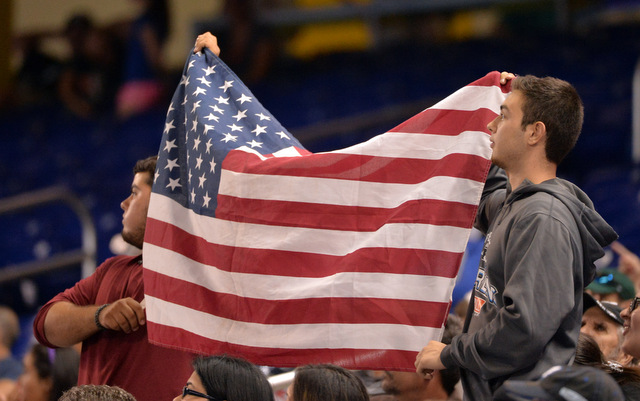Remembering baseball’s role in helping America recover after 9/11 – CBSSports.com
Fourteen years ago today, the world changed forever as a result of the September 11 attacks. That day has affected us all somehow. I’ll never forget the humanity here in New York in the days and weeks following the attacks.
Like many of you, I use sports as an outlet to help escape the stresses of the real world. They’re a way to cope, and after September 11, we were all searching for a way to cope, to feel normal again. On this solemn day, let’s look back and remember how baseball helped America recover following September 11.
Jack Buck’s speech: Baseball was put on hold after September 11 and it did not return until six days later. Hall of Fame Cardinals announcer Jack Buck, then 77 years old and battling lung cancer, stood on the field at the old Busch Stadium to give a speech and read a patriotic poem.
At the time, many questioned whether it was right to resume the season and continue on with our lives less than a week after the attacks. Buck answered that question emphatically.
“I don’t know about you, but for me, the question has already been answered,” he said. “Should we be here? Yes!”
Mike Piazza’s home run: The first major sporting event held in New York following September 11 was a Mets–Braves game at Shea Stadium on September 21. Mets players and personnel wore New York City Fire Department and Police Department hats to show support.
The Mets were 5 1/2 games back in the NL East and chasing the Braves at that point, so the game had big postseason implications in addition to giving New York fans a chance to root for their team at home for the first time since the attacks.
In the bottom of the eighth inning, right after Brian Jordan drove in Cory Aldridge to give Atlanta a 2-1 lead, Mike Piazza hit a go-ahead two-run home run off Steve Karsay as the fans at Shea chanted, “USA! USA! USA!”
Here is the homer, the call by the great Howie Rose, and the emotional reaction from the New York fans:
“It was almost like a blur to me, it was almost like a dream, sort of surreal,” said Piazza to reporters following the game. “I’m just so happy I gave the people something to cheer. There was a lot of emotion. It was just a surreal sort of energy out there. I’m just so proud to be a part of it tonight.”
President Bush’s first pitch: The Yankees won their fourth straight AL pennant in 2001, meaning the World Series returned to New York just a few weeks after September 11.
The first two games of the Fall Classic were played in Chase Field in Arizona. Game 3 returned to New York, and President George W. Bush was there to throw out the first pitch. As the story goes, Bush was warming up in the batting cage when he asked Derek Jeter whether he should throw from the mound or the grass. Jeter told him the mound, but warned, “Don’t bounce it, they’ll boo you.”
With snipers on the Yankee Stadium roof and Secret Service agents in the stands, President Bush made his way to the mound at the old Yankee Stadium before Game 3, on October 30. He gave the crowd a thumbs up and fired a perfect strike:
“Nine months into the presidency, I was used to being introduced to a crowd,” wrote Bush in his memoir Decision Points. “But I’d never had a feeling like I did when Bob Sheppard, the Yankees legendary public-address announcer, belted out, ‘Please welcome the President of the United States.’ I climbed the mound, gave a wave and a thumbs-up, and peered in at the catcher, Todd Greene. He looked a lot farther away than 60 feet, six inches. My adrenaline was surging. The ball felt like a shot put. I wound up and let it fly.”
The September 11 attacks pushed the World Series into November for the first time in history, but no one minded. Baseball brought us all together and gave us a way to cope with that unspeakable tragedy. Baseball is a kid’s game, yes, but it can be so much more than that.
“In baseball’s function as a social institution, we wanted to be not only sensitive, but we wanted to play our little part in the recovery process,” said commissioner Bud Selig following the attacks in 2011. “It was a painful time, an emotional time, but we did fulfill that role.”




